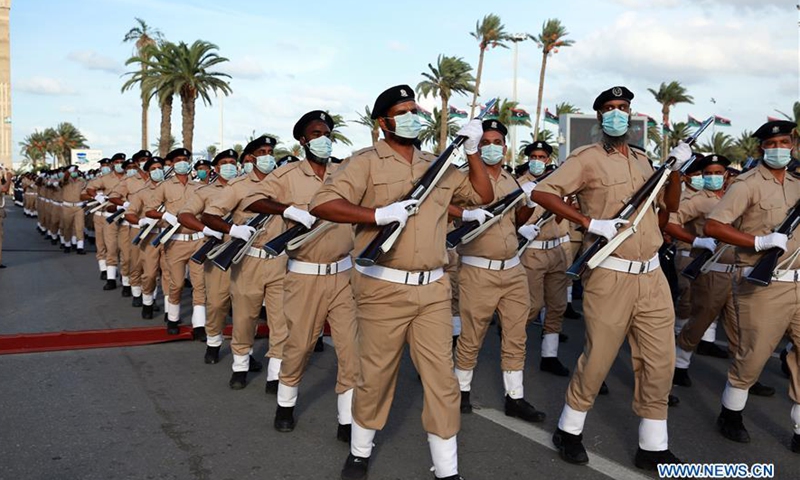Libya talks end without naming govt
Decade-long conflict continues despite UN efforts for peace, reconciliation

Members of Libyan police participate in a parade during the Libyan Police Day celebration in Tripoli, Libya, on Oct. 8, 2020.Photo:Xinhua
UN-led talks aimed at appointing an executive to help lead Libya out of a decade of conflict ended Sunday without discussing names, the world body said."We have agreed to reconvene in about a week in a virtual meeting [to] agree on the selection mechanism for the coming authority," the UN's interim Libya envoy Stephanie Williams told journalists.
But she said "no names... were discussed" during the meetings in neighboring Tunisia.
Libya has been riven by conflict since the 2011 NATO-backed uprising that toppled and killed veteran leader Muammar Gaddafi.
The latest phase in renewed efforts for peace in the North African country brought together 75 delegates selected by the UN to represent a broad range of constituencies.
They were charged with laying out a road map toward elections, setting the mandate of an interim executive and naming its members.
But observers have criticized the way the delegates were chosen and cast doubts over their clout in a country where two administrations, as well as an array of armed groups and foreign powers, are already vying for power.
Libya is currently dominated by a unity government in Tripoli that emerged from previous UN-led talks in 2015, and its rival, the eastern-based House of Representatives (HoR) elected in 2019 and which never recognized the unity government.
In 2019, HoR-allied commander Khalifa Haftar, who was backed by Russia and the UAE, launched a military campaign to seize Tripoli.
But after a year of bloody stalemate on the edges of the capital, his forces were repelled by pro-unity government forces boosted by Turkish military support.
Military talks led to a formal cease-fire deal in October, and recent developments on parallel economic and political tracks have raised hopes for progress.
Williams said Sunday she was "very pleased with the outcome" of the Tunisia talks. But observers have noted major obstacles to a lasting solution.
Jalel Harchaoui, a Libya specialist at the Clingendael Institute in The Hague, warned that foreign interests could easily derail the process.
But the architect of the current UN process, Ghassan Salame, told AFP on Friday he had higher hopes than ever for peace, citing "an accumulation of positive factors."
He noted that Libyans were increasingly hostile to foreign interference and the presence of mercenaries.
Salame also said Turkey and Russia could see the fruition of infrastructure contracts worth billions of dollars, signed with the Gaddafi's government, but which Libyans were still keen to honor.
AFP
